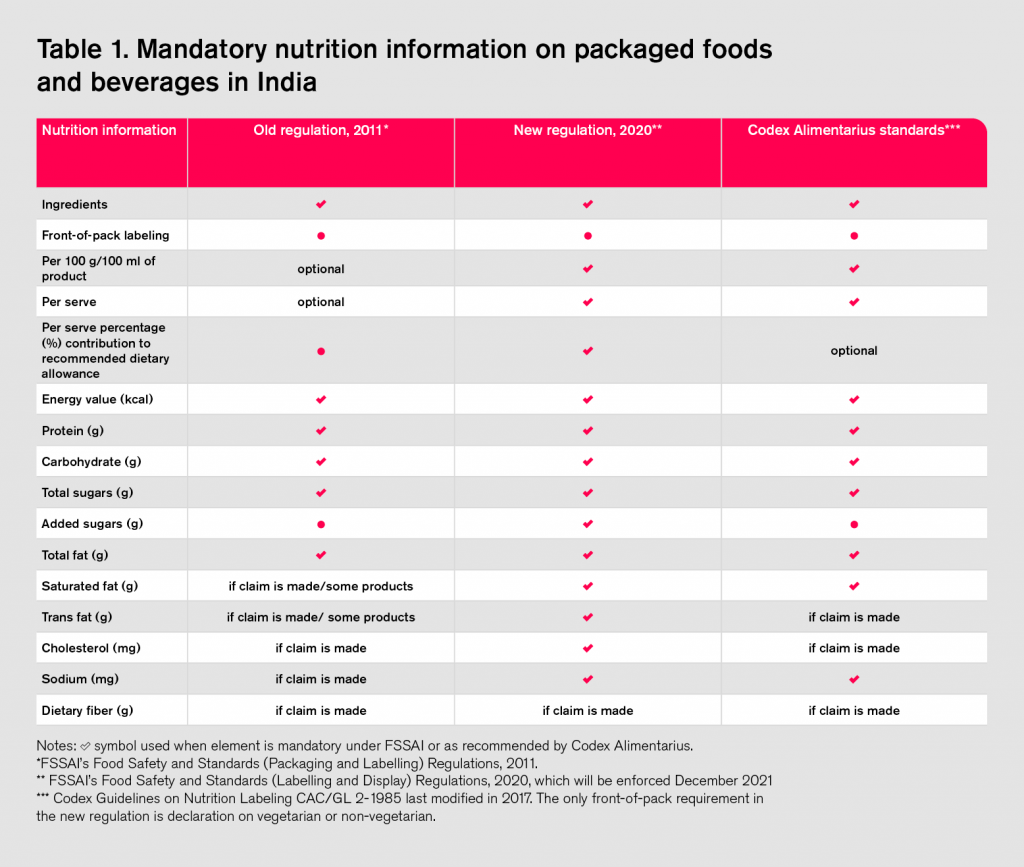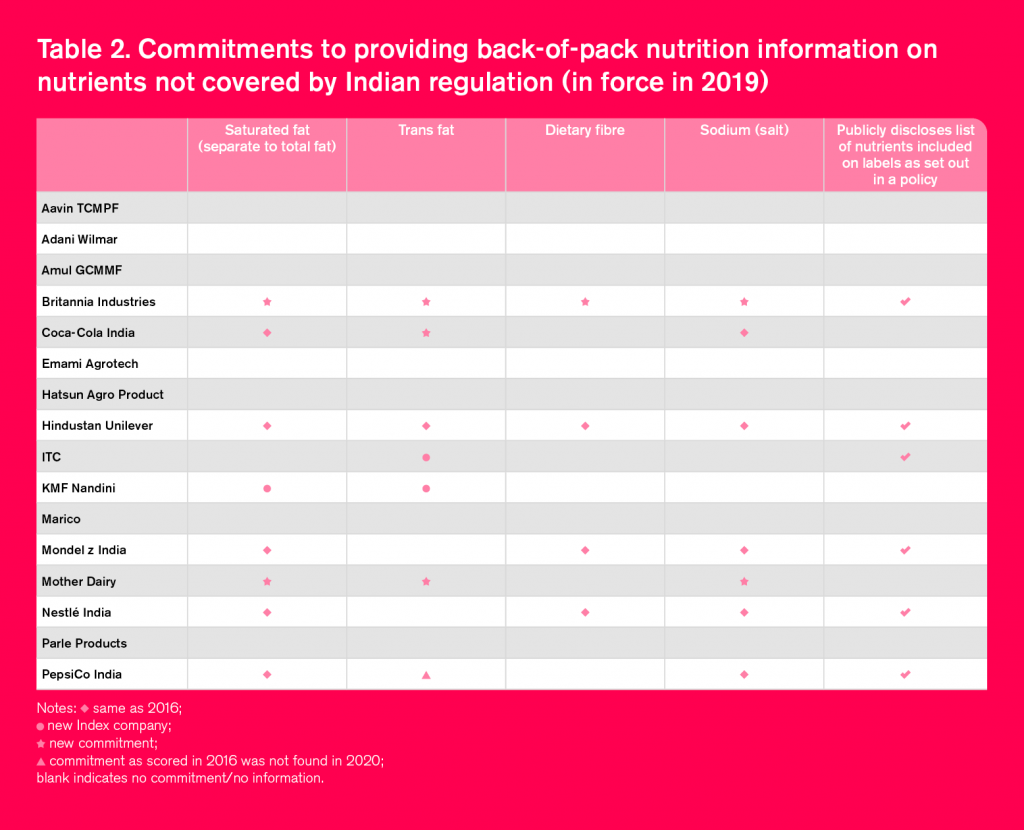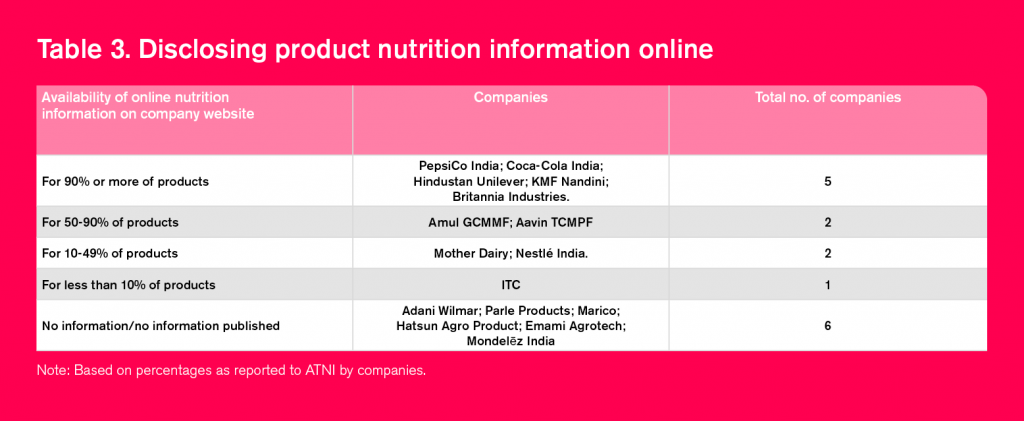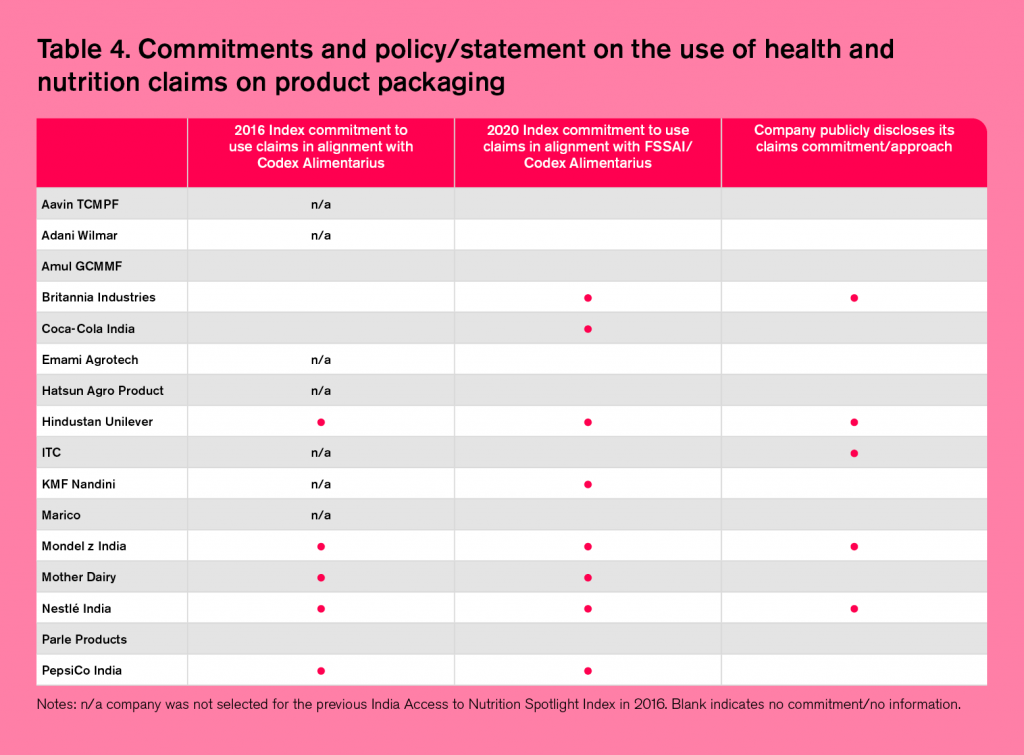Category F: Labeling and claims
Product Labeling and use of health and nutrition claims (10% of overall score)
Category F consists of two equally weighted criteria:
-
F1
Product labeling
-
F2
Nutrition and health claims
To perform well in this Category, a company should:
- Adopt and publish a nutrition labeling policy to ensure that consumers have access to accurate information to help make informed choices about which products they consume.
- Commit to labeling all relevant nutrients, including but not limited to, saturated fat, trans fat, sodium, and dietary fiber on all of their products.
- Adopt and publish a claims policy to ensure terms used are not misleading and help consumers make informed choices, appropriate to their needs.
Context
Food labeling informs consumers about the nutritional composition of packaged foods and beverages (other labels on food products show, for example, the shelf life of products). Nutrition information is usually found in panels at the back-of-pack and generally includes ingredients, nutrient content of the product and the total energy or calories provided.
Studies on the impact of nutrition labeling among Indian consumers are, however, limited. A 2014 cross-sectional study, which interviewed 1,832 consumers in New Delhi and Hyderabad, showed that the majority found it difficult to comprehend nutrition information on packaging. A different study which interviewed 300 educated youths (18-30 years old) found that over 50% of the respondents felt that labels influenced their food purchase choices.
Interpretative labels are a simpler and easier-to-understand alternatives to numeric labels, which can help people better understand the nutrition content of the products they buy. These interpretive labels are usually found in the font-of-pack (FOP) of packed foods and beverages. Different voluntary and mandatory FOP schemes have been adopted in over 30 countries around the world (see for example NOURISH framework from WCRF). Formats include color-coded labels, grading labels and warning labels.
At the time of research for the Index in 2019, FSSAI was working on new labeling regulations which included an interpretive labeling proposal. According to a draft regulation, all food companies would need to declare nutrition information front-of-pack. A red label would be applied to products that exceed stipulated total levels of calories, fats, trans fat, sugar and sodium per serving.
In a commentary about the new proposal, professionals from India’s National Institute of Nutrition suggest that the 2019 draft proposal, at the time, failed to meet the needs of the Indian population who are illiterate (which makes up almost one quarter of the population ). Authors suggested, a symbol-based system could be more beneficial. In addition, the authors highlight the importance of including food manufacturers in the policy development process and recognize their concerns related to using red, as consumers can relate it to danger.
After a dialogue in 2019 and 2020 between industry and government, the draft proposal was changed into a new regulation. On December 14, 2020, after the research period for this Index, the FSSAI published the “Food Safety Standards (Labelling and Display) Regulations, 2020” which will be enforced December 2021. The new regulation strengthens the scope of the requirements in alignment with international Codex Alimentarius standards (see Table 1). These developments are vital, allowing for more transparency for consumers and in support of Government campaigns like ‘Eat Right India.’ This new regulation, however, has very limited front-of-pack nutrition labeling requirements The front-of-pack requirements in the new regulation are declaration on vegetarian or non-vegetarian, organic foods, as well as the addition of a logo when a product has been fortified. It does not include red FOP labels for products exceeding certain nutrient thresholds.
Apart from the new labeling regulation mentioned above, two other important regulatory changes have occurred since the previous ATNI India Index was published in 2016:
- The Food Safety and Standards (Fortification of Foods) Regulation, 2018:
- This regulation makes it mandatory for food manufacturers to adhere to fortification guidelines when voluntarily adding micronutrients to the following staples: milk, oil, rice, “atta” (wheat flour), and “maida” (refined wheat flour). All products that are fortified according to this new regulation must use the +F logo on their labels.
- The Food Safety and Standards (Advertising and Claims) Regulations, 2018:
- This regulation came into effect on July 1, 2019 and sets out the conditions that companies must follow when placing nutrition content or health-related claims on their products.
These two 2018 regulations are harmonized with globally recognized Codex Alimentarius standards. ATNI adapted the indicators used in the 2016 Index to assess in this 2020 Index the degree to which companies confirm and disclose their approach to implementing these regulations. The methodology and research for this Index was conducted before the publication of the new Food Safety Standards (Labelling and Display) Regulations, 2020, therefore, this category did not take into account the new standards included. As the previous (2011) Indian labelling regulations did not require companies to disclose amounts of sodium, added sugar, saturated and trans fats, and dietary fiber on all products, for this Index research ATNI did identified companies that went beyond legal requirements by committing to disclose these nutrients on their products on the back-of-pack and front-of-pack.

How is food labelling and use of claims affected and relevant in the COVID-19 crisis ?
- The pandemic has emphasized the need to provide accurate, comprehensive and readily understandable nutrition information for all packaged products and across different retail channels. As of June 2020, retailers and food companies reported that some packaged food sales had increased by between 5% and 15% during the lockdown. As the consumption of packaged foods and beverages in India rises, accurate and comprehensive nutrition information becomes more important given the role that healthy diets play in maintaining a strong immune system, a healthy weight and preventing the development of diabetes, hypertension, heart disease and other conditions implicated in more severe and fatal cases of COVID-19.
- As demand for online food delivery services and products that allegedly would have immunity benefits has increased during the COVID-19 crisis, the availability of accurate and evidence-based nutrition information for all products, including online, is increasingly important to empower consumers to make healthier food choices during the crisis and beyond.
- Another evident impact has been on companies’ marketing and claims practices by which the food industry has been pivoting towards products that directly claim to provide protection against COVID-19 (such as Ayurvedic products). This has been partly due to a surge in consumer demands for such products underpinned by the government and prime minister’s message that, ‘the COVID-19 situation is under control because every household is consuming immunity boosters like turmeric milk, the ashwagandha herb, kaadha etc.’ However, such claims have not been formally supported by the FSSAI, who note the importance of consuming a nutritious and balanced diet.
- Companies should refrain from making COVID-19-related health claims and should reinforce commitments to base any claims only on scientific evidence, and in alignment with the regulations of the Food Safety and Standards Authority of India (FSSAI). Furthermore, companies must safeguard labeling standards and should not use the crisis as an opportunity to deviate from existing labeling commitments.
The India Spotlight Index 2020 research did not include indicators to score and rank companies’ responses to the COVID-19. But ATNI did talk to companies about their initial coping strategies and responses to the pandemic between March and June 2020 and ATNI has been tracking publicly available information on industry’s response globally to the COVID-19 crisis, including in India, and reported on trends, best practices and areas of concern in separate reports. Read more about how companies can positively contribute to addressing the global nutrition challenges in ATNI’s COVID-19 Project.
Main messages
- Hindustan Unilever leads Category F with a score of 9.1 out of 10, followed by Nestlé India (8.6) and Mondelēz India (8.5). Britannia Industries, which ranks fourth, shows the largest improvement in Category F among companies also assessed in the first India Index in 2016, improving its score from 2.1 to 7.8 out of 10. This improvement can principally be attributed to the company’s new Nutrition Policy, which includes both elements of nutrition labeling and use of claims, and which is available in the public domain.
- Since the first India Index in 2016, Britannia Industries, Coca-Cola India and Mother Dairy, have improved their labeling practices by committing to disclose the levels of more key nutrients, such as sodium, on the packaging. These advances are important, particularly in support of current government efforts like the Eat Right Movement which seeks to empower citizens to make healthier food choices. Overall, six out of the 16 companies publicly disclose which nutrients they commit to include on their labels. This illustrates the need for companies to increase transparency about their labeling practices, especially with the recently adopted food labeling regulation.
- Five companies — Coca-Cola India, Hindustan Unilever, Mondelēz India, Nestlé India and PepsiCo India — commit to provide nutrition information on the front-of-pack (FOP). However, none of the companies assessed use an interpretive format to provide an indication of how healthy the product is. Instead, they provide numeric information which many consumers can find harder to interpret.
- 10 out of the 16 companies publish nutrition information on their websites, while only five companies — Britannia Industries, Coca-Cola India, Hindustan Unilever, KMF Nandini and PepsiCo India — confirmed with ATNI that they provide nutrition information for at least 90% of their products. In light of the COVID-19 crisis and the already rising online demand for food products , it is essential that companies empower consumers to make healthier choices by providing easily accessible nutrition information online.
- Five out of eight companies that commit to adhere to the Food Safety and Standards (Advertising and Claims) Regulations publicly disclose how they comply with this regulation (Britannia Industries, Hindustan Unilever, ITC, Mondelēz India and Nestlé India).
- Overall, companies’ public disclosure on labeling practices remains limited. Companies that did not provide information to ATNI rank lowest in this Category, with the exception of ITC. ITC’s Food Products Policy includes some information on nutrition labeling and use of claims. Given the rapidly evolving regulatory environment in India, companies are encouraged to adopt and publish a comprehensive nutrition labeling policy that aligns both to Indian and Codex standards, and to publish that policy.
Novelties and best practices
Britannia Industries’ Nutrition Policy
Britannia Industries has demonstrated the greatest improvement in Category F among the companies also assessed in the 2016 Index. Within its newly implemented Britannia Nutrition Policy, the company commits to disclose nutrients not mandated under Indian regulations (as of June 2020) including, saturated fat, trans fats, sodium, and dietary fiber. In addition, the policy states that when health and nutrition claims are made, the company will comply with FSSAI and Codex Alimentarius standards and guidelines. The company’s Nutrition Policy is publicly available and easily accessible through the website, which improves transparency about the company’s overall approach to nutrition and enables stakeholders to hold Britannia Industries to account for adhering to its labeling and nutrition-related commitments.
Coca-Cola India ‘Compare our products’ online tool
Since the previous India Index in 2016, Coca-Cola India has designed an online tool which allows consumers to compare the nutritional quality of the company’s products. In addition, the company provides a description of the functionality of the nutrients and ingredients found in each product, which improves transparency and empowers consumers to make better dietary decisions.
F1 Product Labeling
Since 2016, some food companies’ have improved nutrition labeling by including more key nutrients such as sodium, saturated fat (separate from total fat), trans fat and dietary fiber, which at the time of research were not mandatory under FSSAI standards. For example, seven companies are committed to providing sodium content as part of nutrition labeling, an important improvement from the 2016 Index, due to Britannia Industries’ and Mother Dairy’s additional commitments (see Table 2). Companies that are subsidiaries of multinational food and beverage companies generally have global labeling policies, which apply in India.
Dietary fiber remains the nutrient least covered by Indian companies, while the labeling of saturated fat (separate from total fat) is the most covered among the companies assessed.
Six companies disclose their labeling commitments in a publicly available policy, yet Table 2 shows that only two companies (Hindustan Unilever and Britannia Industries) report a commitment to labeling all four relevant nutrients in their policy statement.
Britannia Industries’ commitments have improved the most in terms of labeling key nutrients compared to the previous 2016 Index results, as shown in Table 2. The company has adopted a Nutrition Policy which outlines its commitments to nutrition labeling and use of claims, stating that the company commits to voluntarily label the content of sodium, dietary fiber, trans fats and saturated fat in all its products.

In addition to disclosing the total content of nutrients in their products, companies can decide to label nutrient information on a per portion basis, which can help consumers choose a more balanced diet. Five companies commit to labeling nutrient information on a per portion or per serving basis: Coca-Cola India, Hindustan Unilever, Mondelēz India, Nestlé India and PepsiCo India. None of the Indian-headquartered companies have a commitment to providing nutritional information on a per serving or per portion basis, as quantified on the label, or on a per 100 g or per 100 ml basis, stating the number of portions or servings contained in the package.
With recent revisions to the Food Safety and Standards (Packaging and Labeling) Regulation 2011, the new draft proposal (to be enforced in December 2021) would mandate all food companies to declare nutritional information on a per serving basis.
Five companies — Coca-Cola India, Hindustan Unilever, Mondelēz India, Nestlé India and PepsiCo India — were found to have commitments to provide nutrition information front-of-pack. Nestlé India, for example, commits globally to providing FOP information on daily energy intake and key nutrients.
In its Nutrition Policy, Britannia Industries makes a general commitment to place nutrition information FOP, but does not specify what information it will provide.
No company was found to commit to providing FOP information using an interpretive (easily understandable, graphic) format.
Ten of the 16 companies publish at least some product nutrition information online, either directly on the company website or on their brand sites. Five companies provide information for 90% or more products. This is a notable improvement compared to the 2016 Index, when only two companies, Britannia Industries and Coca-Cola India, confirmed that they provided nutrition information online for at least 90% of their products.
None of the companies, except Coca-Cola India, were found to publicly report that they provide nutrition information for products online. Coca-Cola India states in its Transparency Nutrition Information webpage “Information pertaining to nutritional content of our products is also available at the company’s website.” This kind of information disclosure is essential for consumers so they can be sure to easily find all the nutrition information they need.

To improve and accelerate their nutritional information transparency efforts, in particular with regard to disclosure of nutrients of public health importance, such as sodium (salt), sugars and fats, food and beverage manufacturers in India are encouraged to:
- Adopt and publish a comprehensive nutrition labeling policy, in alignment with most recent regulations, that sets out which nutrients will be included on product on the back-of-pack and front-of-pack in understandable and consistent formats; companies are encouraged to go beyond Indian government regulations in their labeling practices and commitments.
- Adopt an interpretative front-of-pack (FOP) labeling scheme for all products, aligned with ongoing government policy development and in consultation with other relevant stakeholders. Interpretive labeling formats should be based on evidence, preferably government-endorsed, as they can have a positive impact helping Indian citizens distinguish between healthy and less healthier products (especially those individuals who are illiterate or have little nutrition knowledge)
- Publish nutrition information online for all products on the company website or branded websites. As e-commerce expands, ATNI encourages companies to work with retailers to ensure accurate and evidence-based nutrition information is available for all products.
F2 Health and nutrition claims
In addition to nutrition labels, claimscan help consumers choose food and beverages that contain (or do not have) specific levels of nutrients or ingredient types. Properly used claims can also help consumers to manage certain health conditions, such as high cholesterol, high blood pressure or diabetes. In order for this to be the case, companies must use health and nutrition claims responsibly, and based on sound scientific evidence.
Criterion F2 assesses companies’ commitments to responsibly use health and nutrition claims, reflecting the new FSSAI (Advertising and Claims) Regulations 2018, which came into force in July 2019.
Eight companies explicitly commit to only placing a health and/or nutrition claim on a product if it complies with either the Codex Alimentarius or FSSAI standards — the latter is aligned with Codex guidelines.
Table 4 shows that eight out of 16 companies assessed have commitments related to their responsible use of health and nutrition claims. Britannia Industries and Coca-Cola India have improved their performance compared to 2016.
Five companies — Britannia Industries, Hindustan Unilever, ITC, Mondelēz India and Nestlé India —publicly disclose their commitments about using nutrition and health claims on products in India. For example, in its new Nutrition Policy, Britannia Industries states that when claims are made on product packaging, these “will comply with the FSSAI Regulations India, Codex Guidelines, and applicable regulations for the International Markets.”
Recommendations
The novelties and best practices shown in this category indicate some companies are stepping up transparency around nutrition labeling and responsible use of health and nutrition claims. To accelerate their efforts to support healthy diets and significantly contribute to India’s malnutrition challenges, food and beverage manufacturers in India are encouraged to:
- Adopt and publish a comprehensive policy covering use of health and nutrition claims. Companies are strongly encouraged to commit only to using health and nutrition claims on healthy products, or products meeting the company’s healthy criteria, to avoid consumer misconception about claims related to less healthy alternatives.
- Improve disclosure on labeling practices and report on relevant metrics, for example products in the market that have claims, so that stakeholders can have a better understanding of performance.


